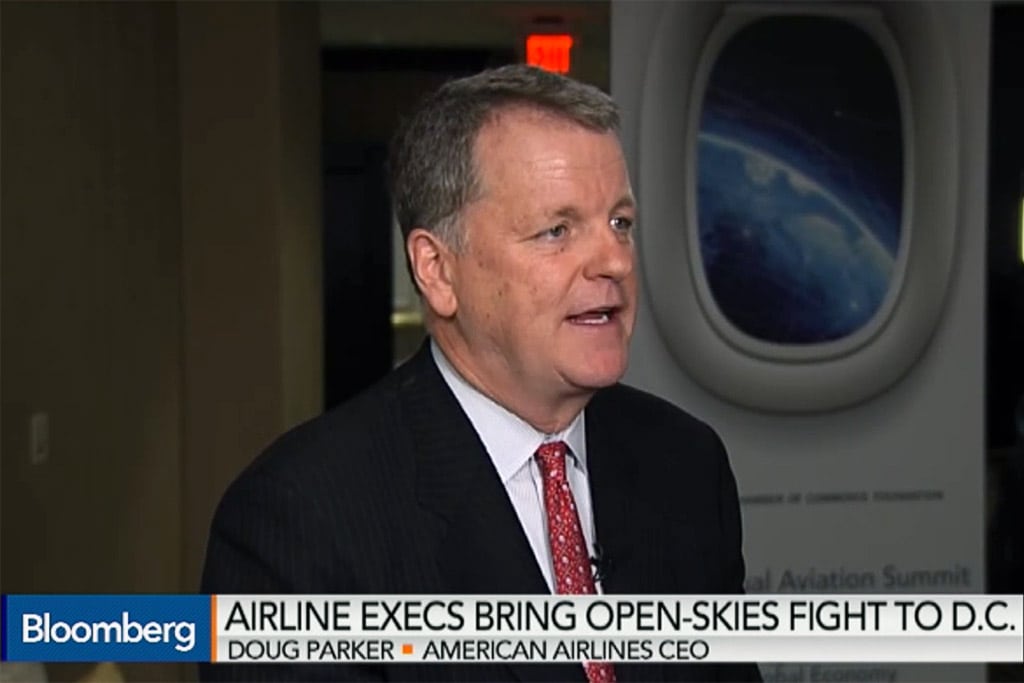Skift Take
The U.S. carriers aren't sure how to battle the Gulf airlines, so they're turning to government for cover. They should be thinking more about the consumer.
Washington, D.C. was abuzz today with airline executives arguing over how open the skies really are between the U.S. and the UAE and Qatar.
Speaking at three separate events, the CEOs of Etihad Airways and American Airlines and the President of Emirates spoke about competition between the three major U.S. carriers — which also include United Airlines and Delta Air Lines — and their Gulf state rivals, including Qatar Airways.
Each airline leader spoke to the main point separating the two groups, namely whether or not the Gulf states receive unfair state aid that allows them to compete on a different level than their U.S. counterparts. American’s Doug Parker and Etihad’s Hogan were attending the 14th Annual Aviation Summit at the US Chamber of Commerce, while Emirates’ Tim Clark held a press conference at the National Press Club and online.
Below are the main points from the day’s conversations.
Emirates
Clark focused on gently rebutting claims of state aid that American and the other U.S. airlines made in a report that was released 11 days ago.
“As far as we are concerned this report cones as a surprise. Surprised it took so long to prepare — it took them two years to deliver it,” Clark said. “I ask that we are given the chance to respond to the multiple allegations in this report. And when we’ve done this I ask that we’re given the benefit of an apology from the people making this allegation.”
Clark did not lay out a timeline for responding to the report, but he promised a “line-by-line response” in what he describe a “methodical, clinical manner.”
Responding to a question from the press, Clark said “I struggle with the allegations they’ve made about market share when they don’t fly to the places we fly to. The smart thing to do is to work with, us not against us. We are already feeding the big three anyway and we receive business from them.”
“We bring 2.4 milion passengers to the U.S., of which 1.7 million came from points not served by the U.S. carriers.”
When asked about $4 billion worth of loans for fuel hedging Clark said, “Tosh. And we will demonstarte on that point. There is a lot of low-hanging fruit on that report to respond to that is very easy.”
American Airlines
“We love to compete, it just needs to be on a fair and level playing field,” American’s Parker told Bloomberg TV.
“If you don’t level the playing field, jobs will flow from the U.S. to the Gulf. It certainly won’t be good for the consumer if we start flying less and they fly more, then you’ll start seeing those fares going up over time.”
Parker tried to focus on the threat to U.S. jobs that the Gulf carriers pose. “We are already losing jobs. This will just get worse not better,” he said.
Parker does’t want the Gulf carriers to expand into the U.S. anymore until his airline’s concerns are dealt with. “During consultations with the U.S. and the UAE and Qatar, no additional flying be added to the U.S. from those carries,” Parker said. “If we find as they suggest that nothing is amiss here everything will be back to normal.”
Etihad
Speaking today at the US Chamber of Commerce, James Hogan, President and Chief Executive Officer of Etihad Airways made “no apologies for offering new competitive choice for air travellers.”
Hogan painted Etihad Airways as an underdog, saying: “We’ve had to create everything from scratch: every bit of product, every bit of our operations, every bit of our infrastructure,” he said. Many established airlines, he argued, “were gifted amazing infrastructure—airports, terminals, slots, landing rights—over decades. To take them on, we’ve had to work harder and we’ve had to work smarter.”
Hogan countered arguments that Gulf carriers threaten US jobs and US business by saying: “We are major customers of Boeing, of GE, of Sabre, and of many other American businesses. We work with strategic American partners—for example, with Atlas, on developing and improving global cargo operations. We work with US financial institutions, with US tourist boards, with US airports. Our commitment to the US economy supports more than 200,000 jobs.”
Hogan pointed out that the airline’s first Boeing 787 Dreamliner to fly into the U.S. is the second of 71 Dreamliners it has on order from Boeing, and that the airlines’ total orders with the US aircraft manufacturer come to 120 aircraft worth more than US$ 36 billion. He also pointed out that Etihad Airways delivered “180,000 travellers onto the networks of US airlines in 2014, and 50,000 in the first two months of 2015.”
Etihad Airways, Hogan claimed, fills a gap in the market. “No U.S. carrier flies into Abu Dhabi,” he said. “There are very few U.S. carriers operating to where we do in the Indian sub-continent, in south-east Asia, or in the wider Middle East.”
American Airlines’ Doug Parker on Bloomberg TV:
The Daily Newsletter
Our daily coverage of the global travel industry. Written by editors and analysts from across Skift’s brands.
Have a confidential tip for Skift? Get in touch
Tags: american airlines, emirates air, etihad, open skies
Photo credit: American Airlines CEO Doug Parker appearing on Bloomberg TV. Bloomberg
